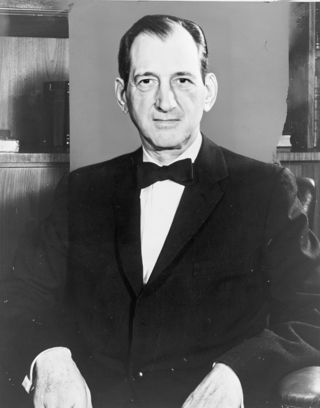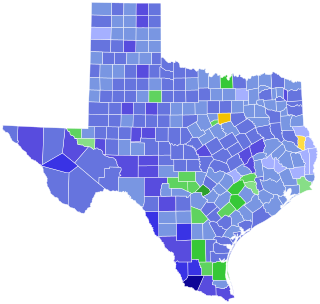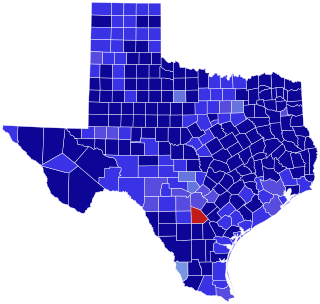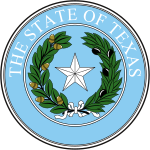
Ralph Webster Yarborough was an American politician and lawyer. He was a Texas Democratic politician who served in the United States Senate from 1957 to 1971 and was a leader of the progressive wing of his party. Along with Senate Majority Leader Lyndon B. Johnson and Speaker of the House Sam Rayburn, but unlike most Southern congressmen, Yarborough refused to support the 1956 Southern Manifesto, which called for resistance to the racial integration of schools and other public places. Yarborough voted in favor of the Civil Rights Acts of 1957, 1960, 1964, and 1968, as well as the 24th Amendment to the U.S. Constitution, the Voting Rights Act of 1965, and the confirmation of Thurgood Marshall to the U.S. Supreme Court. Yarborough was the only senator from a state that was part of the Confederacy to vote for all five bills.

The 1970 United States Senate elections was an election for the United States Senate. It took place on November 3, with the 33 seats of Class 1 contested in regular elections. Special elections were also held to fill vacancies. These races occurred in the middle of Richard Nixon's first term as president. The Democrats lost a net of three seats, while the Republicans and the Conservative Party of New York picked up one net seat each, and former Democrat Harry F. Byrd Jr. was re-elected as an independent.

The 1964 United States Senate elections were held on November 3. The 33 seats of Class 1 were contested in regular elections. Special elections were also held to fill vacancies. They coincided with the election of President Lyndon B. Johnson by an overwhelming majority, to a full term. His Democratic Party picked up a net two seats from the Republicans. As of 2023, this was the last time either party has had a two-thirds majority in the Senate, which allowed the Senate Democrats to override a veto, propose constitutional amendments, or convict and expel certain officials without any votes from Senate Republicans. However, internal divisions would have prevented the Democrats from having done so. The Senate election cycle coincided with Democratic gains in the House in the same year.

The 1958 United States Senate elections were elections for the United States Senate which occurred in the middle of President Dwight D. Eisenhower's second term. Thirty-two seats of Class 1 were contested in regular elections, the new state of Alaska held its first Senate elections for its Class 2 and 3 seats, and two special elections were held to fill vacancies.

William Arvis "Dollar Bill" Blakley was an American politician and businessman from the state of Texas. Blakley was part of the conservative wing of the Texas Democratic Party. He served twice as an interim United States Senator, appointed by the Governor to fill a vacancy until his successor could be duly elected. He served first in 1957 after the resignation of Price Daniel and again in 1961 after the resignation of Lyndon B. Johnson.

The 1934 United States Senate election in Texas was held on November 4, 1934. Incumbent Democratic U.S. Senator Tom Connally was re-elected to a second term. Connally fended off a competitive primary challenge from U.S. Representative Joseph Weldon Bailey Jr. on July 28 before facing only nominal opposition in the general election.

The 1972 United States Senate election in Texas was held on November 7, 1972. Incumbent Republican U.S. Senator John Tower won re-election to a third term.

The 1982 United States Senate election in Texas took place on November 2, 1982. Incumbent Democratic U.S. Senator Lloyd Bentsen won re-election to a third term in office, defeating Republican U.S. Representative James M. Collins.

The 1970 United States Senate election in Texas was held on November 3, 1970. Incumbent Democratic U.S. Senator Ralph Yarborough was defeated by former U.S. Representative Lloyd Bentsen in the Democratic primary. Bentsen then defeated Republican U.S. Representative and future president George H. W. Bush in the general election. When Bush was running for president in 1988, his Democratic opponent, Massachusetts Governor Michael Dukakis, selected Bentsen as his vice presidential running mate.
Thaddeus Thomson Hutcheson, was a Republican attorney in his native Houston, who was an early figure in the movement to establish a competitive two-party system in the U.S. state of Texas.

The 1964 United States Senate election in Texas was held on November 3, 1964. Incumbent Democratic US Senator Ralph Yarborough defeated future US President George H. W. Bush handily. This would prove to be Yarborough's final term as a senator. Bush later went on to win an election for the US House of Representatives in 1966 and was subsequently elected US Vice President in 1980, re-elected in 1984, and was elected president in 1988.

The 1942 United States Senate election in Texas was held on November 3, 1942. Incumbent Democratic U.S. Senator W. Lee "Pappy" O'Daniel was re-elected to a second term.

The 1957 United States Senate special election in Texas was held on April 2, 1957, to complete the unexpired term of Senator Price Daniel, who resigned to become Governor of Texas. Interim Senator William Blakley did not run for re-election. Ralph Yarborough won the race with a plurality of the vote; no majority was required.

The 1916 United States Senate election in Texas was held on November 7, 1916. Incumbent Democratic U.S. Senator Charles Culberson was re-elected to a fourth term in office. Culberson survived a challenge from former Governor Oscar Colquitt in the Democratic primary, then easily won the general election. He was challenged by Republican Alex W. Atcheson and Socialist Thomas Hickey, publisher of The Rebel.

The 1930 United States Senate election in Texas was held on November 4, 1930. Incumbent Democratic U.S. Senator Morris Sheppard was re-elected to a fourth term in office, easily dispatching his challengers.

The 1940 United States Senate election in Texas was held on November 5, 1940. Incumbent Democratic U.S. Senator Tom Connally was re-elected to his third term in office, with only minor opposition in the Democratic primary and general elections.

The 1946 United States Senate election in Texas was held on November 5, 1946. Incumbent Democratic U.S. Senator Tom Connally was re-elected to his fourth term in office, with only minor opposition in the Democratic primary and general elections.

The 1954 United States Senate election in Texas was held on November 2, 1954. Incumbent Democratic U.S. Senator Lyndon Baines Johnson was re-elected to a second term in office, easily dispatching his challengers.

The 1960 United States Senate election in Texas was held on November 8, 1960. Incumbent Democratic U.S. Senator Lyndon Baines Johnson, who was simultaneously running for Vice President of the United States, was re-elected to a third term in office. Johnson had Texas law changed to allow him to run for both offices at once. As of 2024, this is the last time the Democrats won the Class 2 Senate seat in Texas.
Democrat William Proxmire won a special election to fill the vacancy created by the death of Senator Joseph R. McCarthy (R-WI). Also, Price Daniel (D-TX) left the Senate to become governor of Texas, and Democrat Ralph Yarborough won a special election for that Senate seat. The Democrats thus made a net gain of one seat. However, Congress was out of session at the time of the Democratic gain in Wisconsin, and the Republicans gained a Democratic-held seat only weeks after the next session started, when Republican John D. Hoblitzell Jr. was appointed to fill the vacancy created by the death of Senator Matthew M. Neely (D-WV).





















